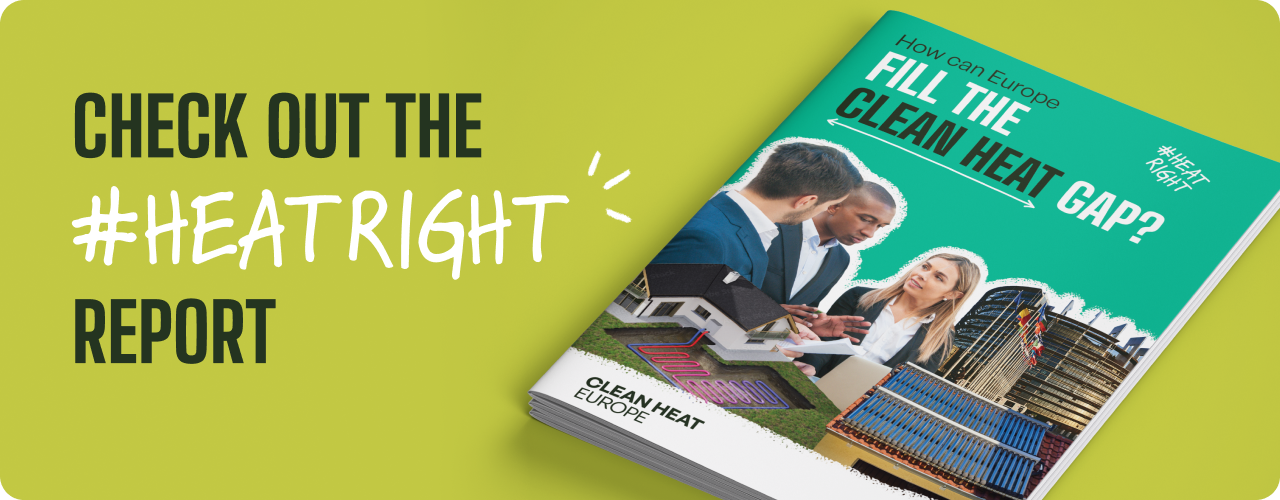
How can Europe
Fill the clean
Heat gap?
Next European Commission must seize opportunity to boost competitiveness and make clean heat a political priority, finds new report
The EU and national governments are currently failing to support a clean heat roll-out, despite the significant boost to Europe’s competitiveness and energy security a transition to renewable energy-powered heating and cooling would bring, a new report finds.
The report, ‘How Europe Can Fill the Clean Heat Gap’, is based on a study by research firm Trinomics which examined clean heat readiness in 12 EU countries*. The study found policies are not yet strong or consistent enough to encourage a wide-scale uptake of clean heating and cooling systems. Across the 12 countries studied, some have made good progress towards supporting the clean heat sector and consumers, but most are not yet taking enough action.
Jozefien Vanbecelaere, Head of EU Affairs at the European Heat Pump Association (EHPA) said: “We urge the next European Commission, and national governments to make clean heating and cooling a political priority. With ambitious policy signals, Europe can strengthen its clean heat industry, boost clean tech competitiveness, reduce greenhouse gas emissions and protect households, businesses and industry from volatile fossil fuel prices.”
The study finds progress towards clean heat is varied across the 12 EU countries studied.
“Clean heating solutions such as heat pumps and PV rely on safe, ready and efficient in-building electrical installations – they should be upgraded during renovation works to guarantee safety, anticipate future needs and optimise efficiency. Renovation and clean heating policies and supporting instruments must be holistic and integrate electrical installations.”, explains Quentin de Hults, Director General at International Copper Association Europe (ICA Europe).
Key findings
Half of the 12 countries studied plan to phase-out fossil heating, and almost all provide technical assistance to consumers who switch to clean heat. All countries offer some financial support, but in many this is limited. Out of the countries analysed, only half support low-income households.
Many countries also still provide subsidies for fossil heating, and in some countries the price of electricity is too high to encourage the switch. Seven countries surveyed have local heating and cooling plans, but in many countries complex administrative processes hinder the transition.
Recommendations to boost the clean heat transition
Considering the incoming EU’s strategic priorities and the role of Member States in implementing EU policies and NECPs. the report ‘How Europe Can Fill the Heat Gap’ makes recommendations to the EU and these members state to phase out fossil fuel use in buildings and encourage the uptake of clean heat technologies through clean heat standards. It recommends the rapid publication of the EU Heat Pump Action Plan and a revised EU heating and cooling strategy, as well as clear national heating and cooling targets. It also backs financial support, in particular for low-income households, and lower electricity costs to ensure a just transition to clean heat, as well as technical support through requirements for new and renovated buildings, and device interoperability.
“The report points to the critical need to accelerate heating & cooling decarbonisation in buildings. Access to affordable clean heat solutions such as district heating should be hassle free and affordable for all citizens. Ahead of the next mandate, we call on national and EU policy-makers to ‘mind the clean heat gap’ and prioritise the rollout of clean heat!”, says Pauline Lucas, Policy Director at Euroheat & Power.

Download the report and discover more
about the clean heat market, the state of play and
the clean heat policy context.
*The Trinomics study, ‘Clean heat readiness in Europe: A survey of Member States’, analysed clean heat readiness based on three areas: (1) the status of mainstreaming clean heat nationally, (2) ensuring the affordability of clean heat, and (3) addressing barriers to clean heat deployment in Croatia, Czechia, Denmark, Finland, France, Germany, Hungary, Italy, Lithuania, Poland, Spain, and Sweden. The analysis is based on interview with experts from industry associations.